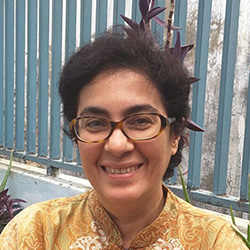
Concerns about the sustainability of palm oil have prompted widespread demand from consumers and governments across the globe for enhanced transparency and traceability. In Indonesia, which is the world’s largest palm oil producer and exporter, a new model called Simulation of Indonesian Palm Oil Sustainability (SIPOS) promises to serve this cause.
The Center for International Forestry Research and World Agroforestry (CIFOR-ICRAF) led the development of the model, which was built on the Jurisdictional Approach for Palm Oil Sustainability (JAPOS) framework – a similar model developed at the regional level.
“This system dynamic model is built through the palm oil supply chain approach starting from the plantation, then the mill, the refinery, and so on,” said Benny Okarda, a senior research officer at CIFOR-ICRAF, during the Third National Workshop on “Strengthening Sustainable Palm Oil for Community Welfare and Climate Crisis Mitigation” in Jakarta, 11 January 2024.
The model incorporates data from the Ministry of Agriculture’s Directorate General of Plantations and utilizes a 2022 baseline for more accurate projections. “At the national level, there are several interventions we are trying to measure, such as increasing productivity, forest protection, and peat areas,” said Okarda. “The indicators we use are production, forest cover, emissions and volume and trade value.”
Using data from various sources, including an updated biomass map and plantation statistics, SIPOS aims to help users balance economic growth with emission reductions and social impacts. The tool can also project impact from compliance with the European Union’s new Deforestation-Free Regulation (EUDR), and various other international standards.
In general, said Okarda, SIPOS was developed to help users understand the trade-off between economy, emission reduction and social impacts. “For example, one of the uses of the system is for macro-level planning. The model can also project the parameters mentioned in the indicator section in [the national action plan for sustainable palm oil] RAN-KSB.”
Ani Adiwinata, a CIFOR-ICRAF scientist, also presented findings on palm oil value chain traceability dynamics in the districts of Pelalawan and Kutai Kartanegara. Her study underscores the importance of data availability and cross-sector collaboration for effective traceability along the palm oil value chain.
“For an effective jurisdictional approach, it is important to address the issue of limited data on traceability along the value chain,” said Adiniwata. “This needs to be addressed by adopting a systematic approach in preparing integrated baseline data that is based on cross-sector collaboration and involvement of all stakeholders at the village, district, and national levels.”
Given that palm oil is transported across administrative boundaries, it will be particularly important to facilitate memoranda of understanding (MoUs) to allow for the application of more integrated jurisdictional approaches across districts and provinces in the future, she said.
Disclaimer:
This article and event are part of CIFOR-ICRAF research on scaling jurisdictional approaches in the Indonesian palm oil sector. The research is funded by the Walmart Foundation. Its findings, conclusions, and recommendations do not necessarily reflect the opinions of the Walmart Foundation.
We want you to share Forests News content, which is licensed under Creative Commons Attribution-NonCommercial-ShareAlike 4.0 International (CC BY-NC-SA 4.0). This means you are free to redistribute our material for non-commercial purposes. All we ask is that you give Forests News appropriate credit and link to the original Forests News content, indicate if changes were made, and distribute your contributions under the same Creative Commons license. You must notify Forests News if you repost, reprint or reuse our materials by contacting forestsnews@cifor-icraf.org.












